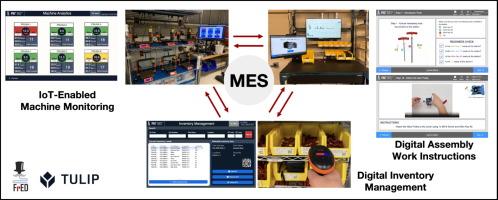通过使用低代码/无代码平台在学习型工厂中开发数字制造系统进行学习
IF 2
Q3 ENGINEERING, MANUFACTURING
引用次数: 0
摘要
本研究展示了低代码/无代码(LCNC)平台如何使没有软件开发背景的本科生能够设计和构建数字制造系统。学生们使用Tulip interface(一个LCNC平台)开发了一个支持物联网的制造执行系统,重点关注麻省理工学院FrED工厂(一个学习型工厂)的库存跟踪、机器监控和数字工作指令等应用。通过试点研究的评估表明,学生们在将大部分时间花在系统设计而不是软件开发上的同时,对智能制造概念有了深刻的理解。个人访谈和访谈后的调查显示,LCNC平台系统设计和调试的平均时间比例分别为70-30%。此外,对于该项目是否增强了他们对智能制造概念的理解,所有学生都表示“非常同意”。LCNC平台提供了一种实用的、可访问的方法来教授数字制造,并可以加速教育和工业环境中的技能发展。本文章由计算机程序翻译,如有差异,请以英文原文为准。

Learning through development of a digital manufacturing system in a learning factory using low-code/no-code platforms
This study demonstrates how low-code/no-code (LCNC) platforms can enable undergraduate students without software development backgrounds to design and build digital manufacturing systems. Students developed an IoT-enabled Manufacturing Execution System using Tulip Interfaces—an LCNC platform, focusing on applications like inventory tracking, machine monitoring, and digital work instructions in the FrED Factory—a learning factory at MIT. Evaluation through a pilot study showed students gained a strong understanding of smart manufacturing concepts while spending most of their time on systems design rather than software development. Individual interviews followed by a post-interview survey highlighted that the average percentage of time split between systems design and debugging the LCNC platform was 70–30% respectively. Additionally, all students responded with “strongly agree” to the question of whether the project enhanced their understanding of smart manufacturing concepts. LCNC platforms offer a practical, accessible approach to teaching digital manufacturing and can accelerate skill development in both educational and industrial settings.
求助全文
通过发布文献求助,成功后即可免费获取论文全文。
去求助
来源期刊

Manufacturing Letters
Engineering-Industrial and Manufacturing Engineering
CiteScore
4.20
自引率
5.10%
发文量
192
审稿时长
60 days
 求助内容:
求助内容: 应助结果提醒方式:
应助结果提醒方式:


